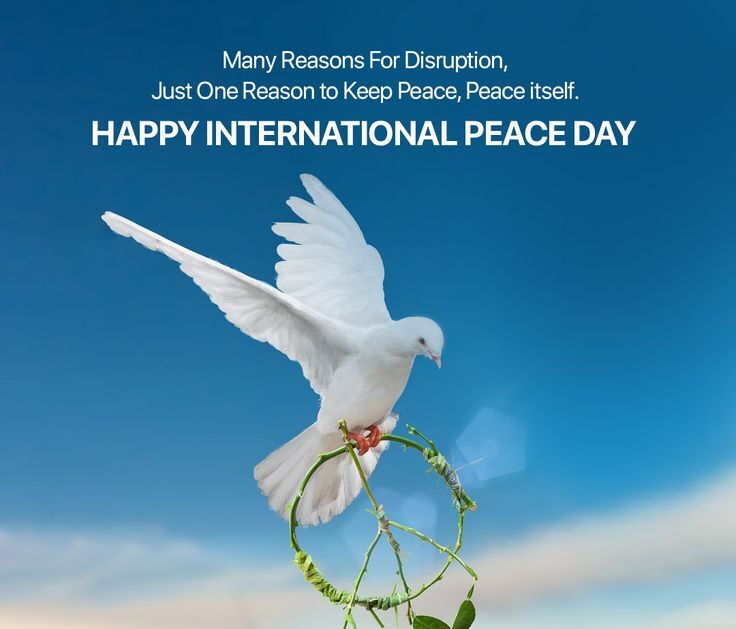International Day of Peace: A Global Call for Unity and Understanding
Introduction
Every year, September 21st marks the celebration of the International Day of Peace, a day dedicated to strengthening the ideals of peace and nonviolence across the world. Established by the United Nations in 1981, this important day encourages individuals, communities, organizations, and nations to promote peace through practical actions, reflection, and advocacy. The goal of the International Day of Peace is to highlight the value of peace in every aspect of life, recognizing the collective responsibility we share in fostering a world free from conflict and violence.
History of International Day of Peace
The International Day of Peace was created by the United Nations General Assembly in 1981 with the aim of recognizing the importance of peace and the need for dialogue and cooperation to resolve conflicts. It was observed initially as a day of ceasefire in conflict zones and a call for nonviolence in areas impacted by war.
In 2001, the United Nations adopted a resolution that made September 21st an annual observance of peace and nonviolence for all people, regardless of their background or location. The day was also reaffirmed as a day of global ceasefire, encouraging both warring factions and peaceful communities to pause and reflect on the importance of peaceful cohabitation.
Each year, the United Nations assigns a different theme to the International Day of Peace, focusing on global issues such as climate change, human rights, gender equality, and conflict resolution. These themes are intended to guide global efforts in working towards a more peaceful world, both at the local and international levels.
Key Facts About International Day of Peace
- Promoting Global Peace: The United Nations first observed the day as a means to encourage global peace, cooperation, and harmony in the face of adversity. Its observance highlights the importance of diplomacy, dialogue, and active efforts in preventing conflicts.
- A Day for Ceasefire: The UN Resolution 36/67 established that September 21st would be a global day of ceasefire, where hostilities cease temporarily, allowing for humanitarian aid and peaceful reconciliation efforts to take place.
- The Role of Civil Society: Civil society organizations, local communities, and grassroots movements play a key role in the observance of this day. Many countries host peace-building activities, such as discussions, marches, and educational programs that emphasize the importance of peaceful conflict resolution.
- Theme of the Year: Each year, the UN chooses a specific theme for the day that resonates with current global challenges. Past themes have included “Shaping Peace Together”, “Climate Action for Peace”, and “The Right to Peace”, which invite people to reflect on the intersection of peace and pressing global issues.
- Peace and Education: The International Day of Peace also emphasizes the role of education in promoting peace. It encourages schools, universities, and educational institutions to hold events, teach peacebuilding techniques, and raise awareness about global issues related to conflict.
- Celebration of Nonviolence: The observance of the International Day of Peace promotes the idea that nonviolence is a powerful tool for achieving social change. It encourages individuals to practice peaceful behavior in their everyday lives, from resolving personal conflicts to promoting a broader culture of peace.
- International Collaboration: Governments, peace organizations, and the general public collaborate in various ways to observe this day, whether through community events, national dialogues, or global initiatives aimed at reducing tensions and promoting peace.
Significance of International Day of Peace
- Fostering Global Unity: In an increasingly fragmented world, the International Day of Peace provides a moment to unite people from all nations, cultures, and backgrounds under the common goal of achieving peace. It emphasizes that peace is a collective responsibility that requires everyone’s involvement, from leaders to individuals.
- Raising Awareness on Peace-related Issues: The day is an opportunity to spotlight issues that disrupt peace, such as violence, human rights abuses, and inequality. The observance educates people on the importance of addressing these issues and making the world a more peaceful place.
- Encouraging Conflict Resolution: The International Day of Peace reminds us of the need for effective conflict resolution strategies, both at the national and international levels. It encourages governments and communities to use diplomacy and nonviolent communication to resolve disputes, whether they are on the global stage or within local communities.
- Peace and Human Rights: Peace is closely intertwined with human rights, and the observance of this day highlights the need to protect the rights and dignity of individuals across the world. It serves as a reminder that long-lasting peace can only be achieved if the rights of every individual are respected and upheld.
- Support for Humanitarian Efforts: International Day of Peace emphasizes the importance of providing humanitarian aid in conflict zones. It encourages support for organizations and volunteers who work to provide relief to those affected by war and displacement.
- Strengthening the Peace Movement: The day helps rally efforts toward peace by bringing together individuals and groups who are dedicated to promoting peace through education, activism, and solidarity. It highlights the importance of creating a global peace movement that stands united in support of nonviolence and human dignity.
Observance of International Day of Peace
- Global Ceasefire: Governments and organizations often observe a ceasefire in conflict zones on September 21st, allowing for humanitarian aid to reach affected regions. This is an opportunity to demonstrate that even in the midst of war, peace can be temporarily restored for a greater cause.
- Peace Marches and Rallies: Many cities around the world host marches and rallies to raise awareness about the importance of peace and nonviolence. These events bring together people from all walks of life to unite for a common cause.
- Educational Initiatives: Schools and universities often hold educational programs that teach students about the significance of peace and the role they can play in creating a more peaceful world. These programs may include workshops, peace-themed arts, and discussions on current conflicts.
- Social Media Campaigns: In the digital age, social media campaigns have become a powerful tool for spreading the message of peace. On International Day of Peace, many people and organizations use platforms like Twitter, Instagram, and Facebook to share peace-promoting messages and activities.
- Community Engagement: In communities worldwide, local peacebuilding efforts are often highlighted during this day. These efforts may include dialogues between diverse cultural groups, peace festivals, and charity events aimed at supporting victims of conflict.
How You Can Celebrate International Day of Peace
- Promote Peace in Your Own Life: Practice peaceful behavior in your personal interactions. Whether it’s through active listening, resolving disagreements peacefully, or offering support to those affected by conflict, you can contribute to building peace in your immediate environment.
- Support Humanitarian Organizations: Consider donating to or volunteering for humanitarian organizations that promote peace and help those affected by conflict. Your support can make a tangible difference in the lives of individuals in need.
- Spread the Message of Peace: Use your social media presence to share messages that promote peace and encourage others to join in the observance. Whether it’s through a simple post or an organized campaign, your voice can inspire others to act.
- Engage in Peace Education: Educate yourself and others about the importance of peace. Read books, watch documentaries, or participate in discussions that highlight conflict resolution strategies and the role of peace in creating a more just world.
- Join or Organize a Peace Event: Participate in a local peace march, rally, or educational event. If there are no events in your area, consider organizing one yourself to inspire others to reflect on and contribute to the goal of global peace.
Important Points About International Day of Peace
- Global Call for Peace: The International Day of Peace serves as a powerful reminder that the pursuit of peace is not only a diplomatic issue but also a personal responsibility for individuals worldwide.
- Promoting Nonviolence: This day is a chance to reinforce the power of nonviolence in all aspects of life, encouraging people to resolve conflicts peacefully and act with compassion.
- A Day of Reflection: September 21st encourages people to reflect on the state of peace in their own communities and countries. It’s a time for deep reflection on what steps can be taken to reduce conflict and violence.
FAQs About International Day of Peace
1. Why is International Day of Peace important?
It is important because it raises awareness about the need for global peace, addresses the causes of conflict, and highlights the collective responsibility of people to promote nonviolence and peace in their communities.
2. How can individuals observe this day?
Individuals can observe International Day of Peace by practicing peaceful behavior, engaging in peace education, supporting humanitarian efforts, and sharing messages of peace with others.
3. What is the theme for this year’s International Day of Peace?
Each year, the United Nations selects a different theme that highlights a specific issue related to global peace. Past themes have included “Shaping Peace Together” and “The Right to Peace”.
4. How does the United Nations observe the day?
The United Nations observes the day through global events, dialogues, and a call for ceasefire in conflict zones. It also encourages member states to promote peace through peacekeeping efforts and humanitarian assistance.
Conclusion
The International Day of Peace is a significant global observance that calls for collective action to achieve lasting peace and harmony across the world. Through education, nonviolence, and a commitment to humanitarian efforts, we can each play a role in fostering a more peaceful and just society. As the world faces increasing challenges, this day serves as a powerful reminder that the pursuit of peace is not only necessary, but possible, when we work together as a united global community.










